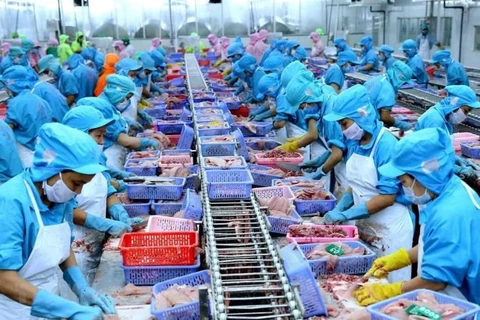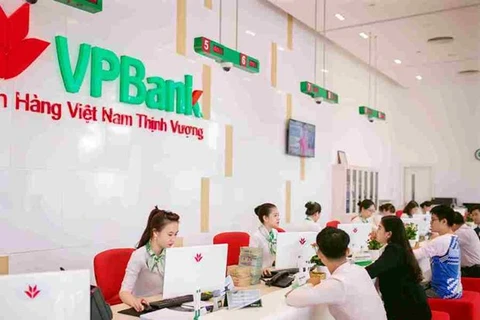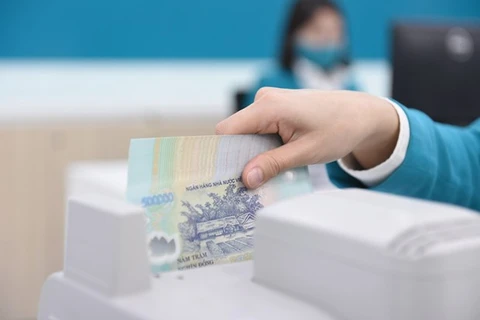Hanoi (VNA) - Governor of the State Bank of Vietnam (SBV) Nguyen Thi Hong has requested that credit growth be achieved in tandem with improving credit quality, with a focus on manufacturing and priority areas.
During a teleconference in Hanoi on April 14, Director of the SBV’s Credit Department for Economic Sectors Nguyen Tuan Anh said that as of March 31, the economy’s outstanding debts had surpassed 9.46 quadrillion VND, up 2.93 percent from late 2020.
Credit growth in agro-forestry-fisheries reached 2.42 percent, industry 3.04 percent, and real estate 3 percent. Meanwhile, credit in securities hit 45.3 trillion VND (1.96 billion USD), down 1 percent from late 2020.
Hong said the SBV has set credit growth at nearly 12 percent this year, with credit in areas of risk to be brought under control.
Violations of banking activities have been mostly found in credit activities. At present, total outstanding debts are equivalent to 140 percent of the country’s GDP.
As of late March, banks had restructured debt repayments for nearly 263,000 customers with outstanding debts of more than 353 trillion VND, and exempt or cut interest rates for over 660,000 customers with more than 1.27 quadrillion VND. Credit organisations have lent over 3 quadrillion VND to more than 452,000 clients since January 23.
In the near future, Anh said the SBV will realign monetary policy with macro-economic and monetary developments as well as the pandemic situation at home and abroad.
At the same time, it will closely control credit in areas of risk, such as securities, real estate, and build-operate-transfer (BOT) and build-transfer (BT) transport projects, while managing risks in lending.
The SBV will prioritise the provision of higher credit quotas for credit organisations that actively reduce lending rates and also encourage financial companies to cut lending rates.
The sector will tackle the difficulties faced by customers who were hit by COVID-19 and natural disasters.
Credit institutions were asked to continue creating favourable conditions for individuals and businesses to access credit, and to work with localities to step up a programme connecting banks with companies./.
During a teleconference in Hanoi on April 14, Director of the SBV’s Credit Department for Economic Sectors Nguyen Tuan Anh said that as of March 31, the economy’s outstanding debts had surpassed 9.46 quadrillion VND, up 2.93 percent from late 2020.
Credit growth in agro-forestry-fisheries reached 2.42 percent, industry 3.04 percent, and real estate 3 percent. Meanwhile, credit in securities hit 45.3 trillion VND (1.96 billion USD), down 1 percent from late 2020.
Hong said the SBV has set credit growth at nearly 12 percent this year, with credit in areas of risk to be brought under control.
Violations of banking activities have been mostly found in credit activities. At present, total outstanding debts are equivalent to 140 percent of the country’s GDP.
As of late March, banks had restructured debt repayments for nearly 263,000 customers with outstanding debts of more than 353 trillion VND, and exempt or cut interest rates for over 660,000 customers with more than 1.27 quadrillion VND. Credit organisations have lent over 3 quadrillion VND to more than 452,000 clients since January 23.
In the near future, Anh said the SBV will realign monetary policy with macro-economic and monetary developments as well as the pandemic situation at home and abroad.
At the same time, it will closely control credit in areas of risk, such as securities, real estate, and build-operate-transfer (BOT) and build-transfer (BT) transport projects, while managing risks in lending.
The SBV will prioritise the provision of higher credit quotas for credit organisations that actively reduce lending rates and also encourage financial companies to cut lending rates.
The sector will tackle the difficulties faced by customers who were hit by COVID-19 and natural disasters.
Credit institutions were asked to continue creating favourable conditions for individuals and businesses to access credit, and to work with localities to step up a programme connecting banks with companies./.
VNA
























